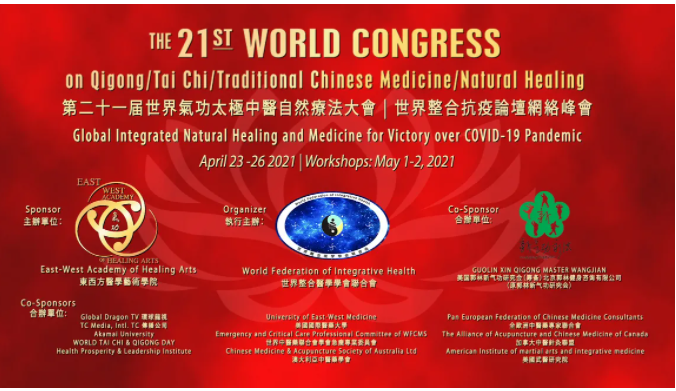
Tai Chi for Healing – Learning & Teaching Research-Based Forms While Respecting Tradition
Click HERE to Register
This workshop is being led by Dr. Tony Gryffin, for the 21ST WORLD CONGRESS ON QIGONG, TAI CHI, TRADITIONAL CHINESE MEDICINE, AND NATURAL HEALING. Workshops are April 30th through May 3rd. Twenty-five experts from the conference have been invited to lead a variety of workshops. Dr. Gryffin's workshop is Monday May 3rd from 11:00 am - 1:00 pm Pacific Time.
(Note: Due to the pandemic, the World Congress is being held online. I have been informed that there have been some technical difficulties. If you have any problems or questions regarding registration or accessing my workshop, please email me at [email protected])
Tai Chi forms have many similarities. But differences in styles and new innovations can be confusing for those interested in learning, and to teachers seeking to promote these arts. This workshop will cover various differences and their impact on health benefits, and an overview of factors which can affect learning, teaching, and promoting of Tai Chi. In his introduction to Dr. Gryffin’s book “Mindful Exercise: Metarobics, Healing, and the Power of Tai Chi,” Bill Douglas noted “This book can help open a portal for an increase to 20, 30 or even 60% of Americans using these highly effective practices, perhaps even expanding them into public education...” Find out how and why. Instruction will be included into how to modify Tai Chi for instant practice while staying true to its traditions, opening a gateway to more people and a lifetime of practice. By the end of the workshop participants will also have a better understanding of the growing variations of Tai Chi and how these differences can affect different aspects of health. This workshop will provide a better understanding of how to promote, teach, and learn tai chi for health.
Biography
Dr. Pete Anthony “Tony” Gryffin, PhD, MS, was an Alumni Fellow in Health and Human Performance at the University of Florida where the focus of his research was on health behavior, and mindful exercise. Tony has over 35 years of experience in Tai Chi, Qigong, and Traditional Kung Fu. He has taught these arts for various colleges, community, and medical centers, including the Shand’s “Arts in Medicine Program.” Tony has authored many articles, studies, and books in the area of mindful health, and is a requested workshop presenter and speaker at regional and national conferences. His award-winning book “Mindful Exercise: Metarobics, Healing, and the Power of Tai Chi,” YMAA Publications, received commendations from doctors and leaders in the field of health at preeminent medical institutions, including the Harvard Medical Center. Currently he is collaborating on a program for nurses and health care workers on mindful practice for resilience and stress reduction.
 RSS Feed
RSS Feed